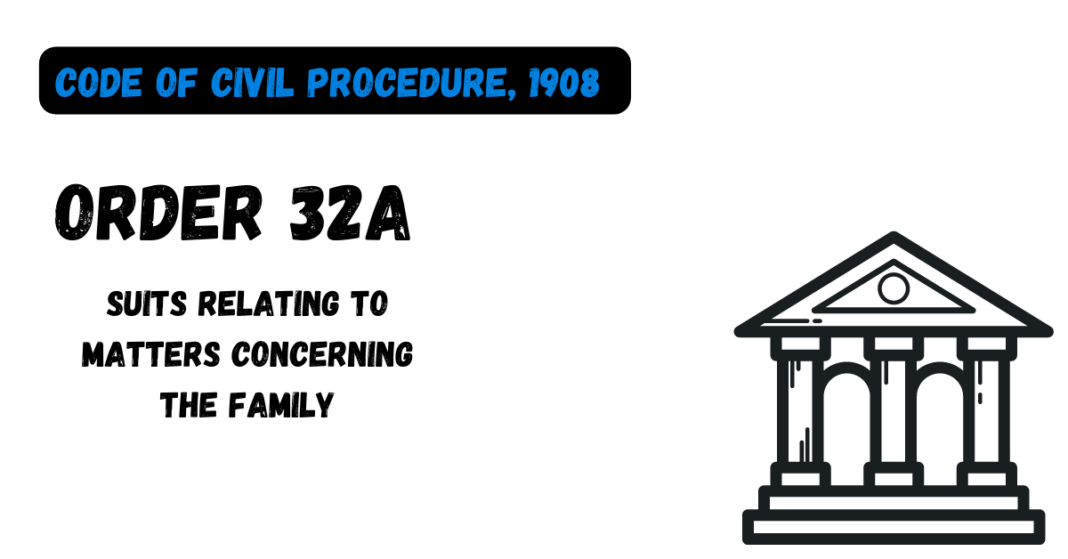1. Application of the Order.—(1) The provisions of this Order shall apply to suits or proceedings relating to matters concerning the family.
(2) In particular, and without prejudice to the generality of the provisions of sub-rule (1), the provisions of this Order shall apply to the following suits or proceedings concerning the family, namely:—
(a) a suit or proceeding for matrimonial relief, including a suit or proceedings for declaration as to the validity of a marriage or as to the matrimonial status of any person;
(b) a suit or proceeding for a declaration as to legitimacy of any person;
(c) a suit or proceeding in relation to the guardianship of the person or the custody of any minor or other member of the family, under a disability;
(d) a suit or proceeding for maintenance;
(e) a suit or proceeding as to the validity or effect of an adoption;
(f) a suit or proceeding, instituted by a member of the family, relating to wills, intestacy and succession;
(g) a suit or proceeding relating to any other matter concerning the family in respect of which the parties are subject to their personal law.
(3) So much of this Order as relates to a matter provided for by a special law in respect of any suit or proceeding shall not apply to that suit or proceeding.
2. Proceedings to be held in camera.—In every suit or proceeding to which this Order applies, the proceedings may be held in camera if the Court so desires and shall be so held if either party so desires.
3. Duty of Court to make efforts for settlement.—(1) In every suit or proceeding to which this Order applies, an endeavour shall be made by the Court in the first instance, where it is possible to do so consistent with the nature and circumstances of the case, to assist the parties in arriving at a settlement. In respect of the subject-matter of the suit.
(2) If, in any such suit or proceeding, at any stage it appears to the Court that there is a reasonable possibility of a settlement between the parties, the Court may adjourn the proceeding for such period as it thinks fit to enable attempts to be made to effect such a settlement.
(3) The power conferred by sub-rule (2) shall be in addition to, and not in derogation of, any other power of the Court to adjourn the proceedings.
4. Assistance of welfare expert.—In every suit or proceeding to which this Order applies, it shall be open to the Court to secure the services of such person (preferably a woman where available), whether related to the parties or not, including a person professionally engaged in promoting the welfare of the family as the Court may think fit, for the purpose of assisting the Court in discharging the functions imposed by rule 3 of this Order.
5. Duty to inquire into facts.—In every suit or proceeding to which this Order applies, it shall be the duty of the Court to inquire, so far it reasonably can, into the facts alleged by the plaintiff and into any facts alleged by the defendant.
6. “Family”—meaning of.—For the purposes of this Order, each of the following shall be treated as constituting a family, namely:—
(a) (i) a man and his wife living together,
(ii) any child or children, being issue of theirs; or of such man or such wife, (iii) any child or children being maintained by such man and wife;
(b) a man not having a wife or not living together with his wife, any child or children, being issue of his, and any child or children being mantained by him;
(c) a woman not having her husband or not living together with her husband, any child or children being issue of hers, and any child or children being maintained by her;
(d) a man or woman and his or her brother; sister, ancestor or lineal descendant living with him or her; and
(e) any combination of one or more of the groups specified in clause (a), clause (b), clause (c) or clause (d) of this rule.
Explanation.—For the avoidance of doubts, it is hereby declared that the provisions of rule 6 shall be without any prejudice to the concept of “family” in any personal law or in an other law for the time being in force.





